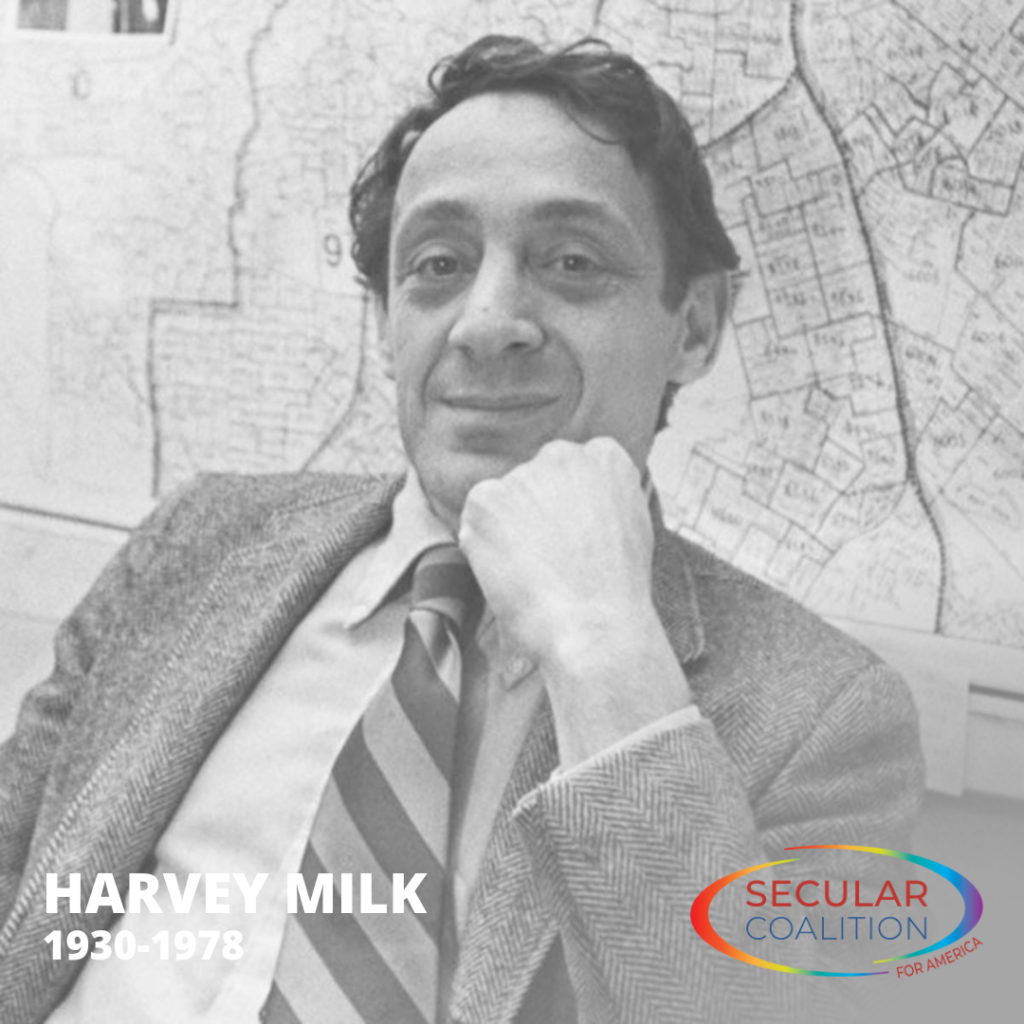Throughout the month of June, we will be sharing information about historic American figures who were involved in both secular and LGBTQIA+ spheres.
Harvey Milk (1930-1978) was a civil rights activist and California politician who became one of the first openly LGBTQ+ elected officials in the United States upon his election to the San Francisco Board of Supervisors in 1977. He was a gay man and a secular Jew whose election and assassination cemented him as one of the most prominent leaders of the LGBTQ+ liberation movement.
Born in Woodmere, New York, Milk wore many hats before arriving on the San Francisco political scene. Raised in a secular Jewish household, he rejected Judaism as a religion (believing it to be “peppered with falsehood and hypocrisy”) but boldly embraced his cultural Jewish identity at a time of rampant anti-Semitism in the United States and around the world. He attended the New York State College for Teachers, graduating in 1951 and deciding to join the Navy. After being officially questioned on his sexuality, Milk left the military in 1955.
Between 1955 and 1972, Milk lived in New York City, working as a teacher, a stock analyst, a Broadway production assistant, and, when the Vietnam War reached its peak in the late 1960s and early 70s, an anti-war activist and demonstrator in New York’s political scene.
Milk moved to San Francisco in 1972, settling on Castro Street, the vibrant hub of the city’s growing gay community. Quickly becoming a popular figure in the neighborhood, Milk ran for the San Francisco Board of Supervisors less than a year after moving to the city in 1973 and again in 1975, losing both times but amassing a significant base of support in the Castro neighborhood and beyond, as well as a large amount of political capital. Despite his losses, he continued organizing in the Castro neighborhood, helping found the Castro Village Association and founding the Castro Street Fair to bring attention, business, and political power to the neighborhood.
By the time he spearheaded an initiative to reform San Francisco’s election system, electing the Supervisors by districts instead of at-large, “The Mayor of Castro Street” had become the veritable spokesperson of the neighborhood and easily won election to the Board on his third bid in 1977.
On the Board of Supervisors, Milk committed himself to an expansive civil rights agenda, fighting for an expansion of library and day care services, affordable housing, anti-discrimination policies, and community policing. During his all-too-short term, Milk became a prominent advocate for all of San Francisco’s marginalized communities, including women and racial and ethnic minorities.
One year into his term, Harvey Milk and San Francisco Mayor George Moscone were assassinated by former Supervisor Dan White. Aware of the hatred that would be directed at him, Milk had pre-recorded in his will in the case of his assassination. Asking for a nonreligious funeral service, Milk remained defiant until the end, saying that “[i]f a bullet should enter my brain, let that bullet destroy every closet door.” Today, California celebrates Harvey Milk Day on his birthday, May 22nd, and Milk’s leadership and dedication lives on in the communities and the activism he led and inspired.



